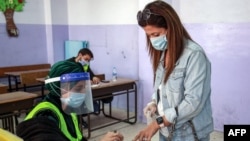Jordanians are electing a new parliament even as COVID-19 infections and death rates soar in the kingdom. The devastating pandemic is plunging this key U.S. Arab ally into an economic crisis with record unemployment. More Jordanian women than ever; however, are running for office. But will they succeed in this kingdom still influenced by Bedouin tribal traditions?
Analyst Oraib Rintawi of the Al-Quds Center for Political Studies in Amman says this vote differs from other parliamentary elections because Jordanians are “in greater distress” due to the coronavirus pandemic overwhelming the health care system.
Jordan has now entered the first wave of the pandemic after initially escaping the worst effects experienced by other countries in the spring, according to health officials.
It is now among the hardest-hit countries struggling to contain the virus’ spread. COVID-19 has also taken its toll on Jordan’s economy, with unemployment topping 32%. Public debt in the aid-dependent and resource-poor kingdom of ten million people — which hosts some 1.5 million refugees — exceeds 100% of its GDP. A four-day lockdown directly follows the voting.
Jordanian political analyst Amer Al Sabaileh views this election for the 130-seat lower house taking place more to fulfill constitutional requirements. That’s because its power remains limited with the king choosing the prime minister and the 65-member senate.
“This election comes in a very hard moment, which is COVID-19, amongst harsh restrictions and changing priorities. At the same time, I don’t think governments in Jordan are enjoying this wide space of credibility anymore. It’s not the elections I wish to see, not on level of engagement, political participation or even popular support for this election. I see it more as a duty, something that should be done,” Al Sabaileh said.
Also, 364 women candidates are vying for seats—the most ever—and for the first time there are three all-women electoral blocs. Dozens of other women are competing for places outside of the 15-seat quota set for women in parliament.
First-time candidate Christine Hanna Nasr told VOA she wants to address the country’s pressing issues after hearing that Jordanians are fed up with the old guard.
“What was happening lately in the parliament speeches, the conduct, it didn’t really reflect our Jordanian culture or society. I want a new parliament that reflects and represents the people in Jordan. If we want change, we have to put our hands all together and dig in. If not, it’s going to stay the same. We have to change things. Now is the time,” Nasr said.
Candidates’ main themes are job creation, overhauling the overburdened health sector as well as ending tokenism – and challenging some patriarchal tribal norms.





